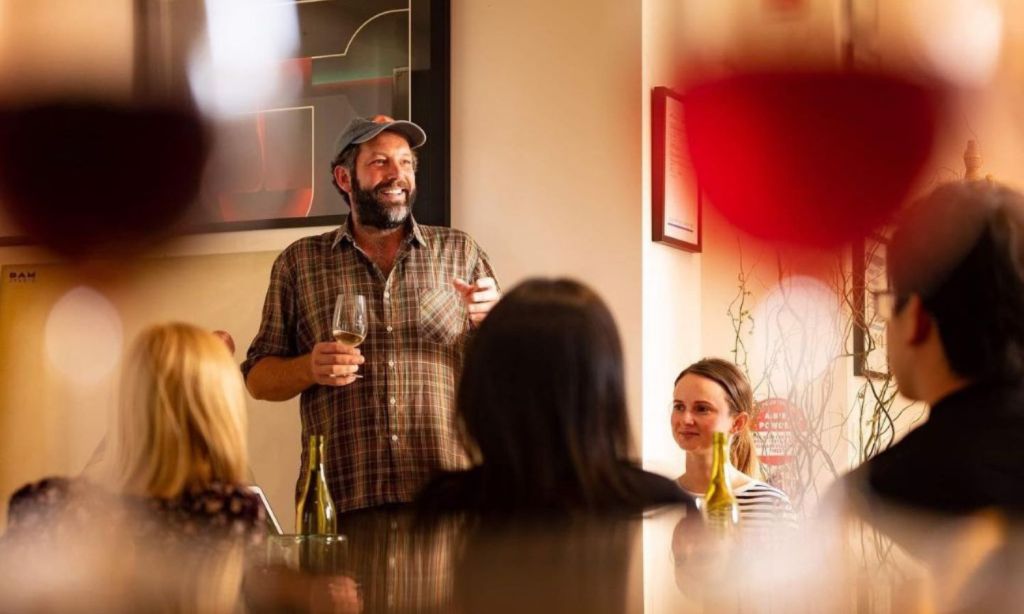ReWine is the bottle shop of the future. We’re not talking about robot wine pourers or any fancy technology. Instead, we’re referring to their unique way of serving wine—direct from the barrel. Where glass bottles once stood on a shelf, side by side like soldiers, are now replaced with wood barrels stacked two high filled with Shiraz, Vermentino, and Prosecco.
“I was running a business called Big Bottle Wine, selling wine in reusable nine-litre bottles on a B to B basis, and decided the natural progression was to sell direct to the public, says ReWine owner Marshall Waters.
“Being brought up in a country family where we reused everything, I’ve always been interested in low-energy housing and packaging.”
You might be surprised to learn the biggest contribution to the carbon footprint of the wine industry is not agriculture or the fermentation process; it’s the bottle itself, says Waters.
Historically wine bottles weren’t always made using glass. They first started as earthen jugs, clay flasks and wooden casks. The Romans were the first to use glass for wine storage, which drastically improved the quality of wine during transportation. Over the years, wine bottles changed in shape and volume, but one thing remained the same—they were glass. Today’s glass bottles are a 17th Century innovation—dark, resilient glass, a slim neck and cork sealing. This is the exact bottle you will receive at ReWine, when you purchase their wines with the intention of bringing it back for a refill.
“By reusing wine bottles, we have reduced our carbon footprint by at least 50%,” says Waters. “We give a $3 dollar discount on refills, this is enough to encourage refilling when it amounts to $36 on every dozen bottles. Most of our regulars take advantage of the extra 15% we offer on six bottles or more. I don’t think the filling theatre has a lot to do with it, more that they are committed to reducing lifestyle.”
The wineries Waters works with include big names such as Seppeltsfield and small winemakers, including Robert Ellis—across south-eastern Australia. “We try to focus on wineries that are pursuing minimal input viticulture in terms of chemicals and fertilisers,” he says.
By working directly with producers, Waters is positioned to provide high-quality wines at a fraction of the cost to consumers. Most of the tipples are from boutique producers and are made on a small scale, and without ReWine, getting the product to market would be difficult. ReWine is bridging that gap and building a community of wine lovers from all aspects.
“We work hard on social media to create relationships with like-minded businesses and organisations. At the end of the day, we want to educate and inspire change—and turn the wine industry upside down, which we’ve been doing since 2005. We’ve worked with the Fringe Festival, Queen Vic Market, and the City of Melbourne,” says Waters.
“We also host workshops with green groups to educate customers about the environmental costs of the single-use bottle.”
Another contribution ReWine reduces dramatically is freight. Through bulk handling, they use around 30% of the normal freight of bottled wine.
Although, Waters says the wine industry as a whole has many strides yet to take to move toward a sustainable future. A few leaders are being quite proactive in going to organic practices, and there is a slow move to wine in a keg. Though, even with this, there is a single-use plastic keg that has questionable credentials on environmental grounds.
“There is a small move to premium wine in “bag in box” but buyer resistance has stopped that from becoming widespread. At ReWine, we love seeing other refill wine stores opening up to help normalise the practice,” he says.
“Generally, it is very slow across the industry as a whole, with most wine still being packaged in single-use heavy-weight glass. There is a low-weight 300 gm bottle that is slowly being adopted, but even with this, there is resistance because the perception is that it’s a cheap bottle for cheap wine.”
Any representations, views or opinions contained in this article are those of The Latch and do not reflect those of and are not endorsed by Suncorp Bank.
Read more stories from The Latch and subscribe to our email newsletter.

